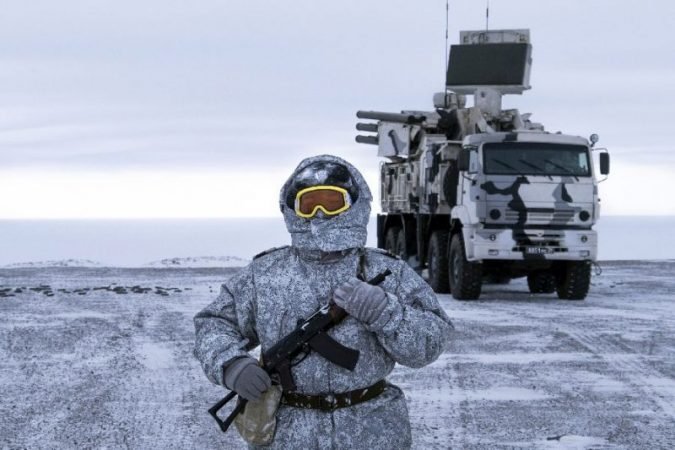The Militarization of the Arctic

Geographically located around the north pole at 66°30′ N this region is surrounded by the Arctic Ocean. Encompassing northern tips of Canada, Russian Federation, Greenland, Norway, Sweden, Finland, Iceland, and the United States, the Arctic Region experiences extremes of solar radiation throughout the year. These distinguishable features have set this region apart from the rest, making it historically inaccessible; with widespread climate change and global warming, this region has now gained global attention. The Arctic Climate Impact Assessment estimates that the temperature in the Arctic Region has risen almost twice as fast as the temperature in any other region in the world in the last century, resulting in a decrease of the polar ice cap. According to Riechmann, the world is experiencing climate change, polar ice caps are melting, making marine paths and routes around the Arctic more accessible.

The Arctic region is highly contentious given its economic, environmental and military value yet the land is not owned by any state. Most countries surrounding have laid claims over this region through the United Nations Convention of the Law of the Sea (UNCLOS) under international law (“Law of the Sea”); the UNCLOS has imposed coastal state jurisdiction and control over the Arctic region, allowing the coastal states to enforce laws, exclusive economic zone around two- hundred nautical miles outwards their respective Arctic coastlines, and regulations to their respective maritime territories in the region. Yet there have been claims over common territories between a few countries in the past. This resulted in the formation of the Arctic Council with Canada, Denmark, Finland, Iceland, Norway, Russia, Sweden and the United States as permanent member states and a few other nations as observer states with no voting rights. This forum discusses wildlife conservation, sustainable development, climate impact, monitoring and assessment, and emergency prevention, preparedness and response with a common agenda to establish peace and security.
A warehouse of untapped natural resources, this region contains one-fifth of the world’s undiscovered oil and natural gas resources, alongside platinum, gold, silver, iron, zinc, copper, and deposits of methane hydrates which are sources of tremendous energy. Since the world war which took place between the late 19th and early 20th century, the Arctic’s exploration began. In this context countries began claiming rights to this territory in order to control new routes, increase the reach of markets, taking advantage of the industrial revolution, while developing a military strategy for the war. During the second war which followed, the Arctic region turned into a strategic ground facilitating supplies between the then allies, Union of Soviet Socialist Republics and the United States of America. This supply and exchange of goods was a result of the “Lend-Lease” program between the two giants which recognised the Arctic to be the shortest route for goods exchange. The wars emphasised on the Arctics’ strategic importance which eventually increased during the cold war between USSR and USA. This short distance between the two antagonistic powers led to the militarisation of this region, resulting in the development and stationing of intercontinental ballistic missile systems, nuclear powered attack submarines and preventive radar systems. Following the cold war which ended with the defeat of USSR, Mikhail Gorbachev in 1987, called for the Arctic to become a “Zone of Peace”, shaping the region’s post-Cold War order. This interest in arctic disarmament resulted in the formation of the Canadian advocacy for the establishment of an Arctic Council.

In 2007 Russia placed a flag at the exact base of the North Pole, and since then, it has maintained a military presence. Alongside China has also shown interest in the Arctic by heavily investing in this region thus expanding its research and scientific polar institute to collaborate with already existing institutes. In 2014, Russia announced that it intended to make the Arctic a priority region for its navy. Washington has also shown similar interests by entering the scientific and military race for sovereignty over parts of the Arctic. Canada on the other hand has also developed two military bases in the Canadian Arctic. It is only a matter of time that other regions also establish their bases in the Arctic.
Permanent members of the Arctic have signed a formal declaration of neutralization through Ilulissat 2.0. Critiques state that this hasn’t brought in change, it only has explicitly stated what was earlier a norm as neutralization does not set the removal of defensive and constabulary capabilities as a prerequisite, it is a mere commitment to maintaining the peace and stability that exists in the region. The multi-polarization trend of the Greater Arctic region is becoming increasingly evident with talks over demilitarization being off the Arctic states’ political agenda. Although the countries’ developments on the security front to militarise it have been made clear, there still persists a dire need to analyse and reinstate a thorough resolution to stabilise the region by demilitarising it.


















